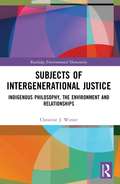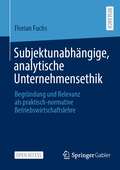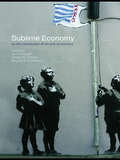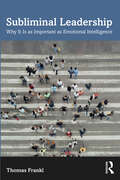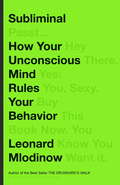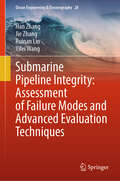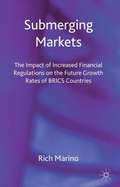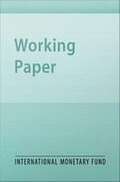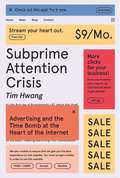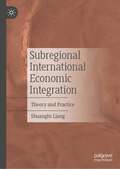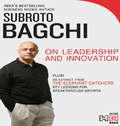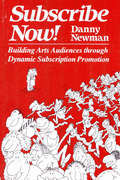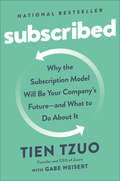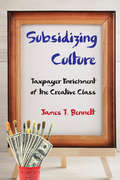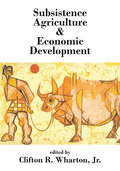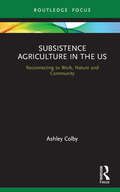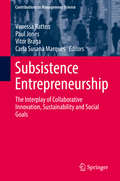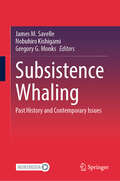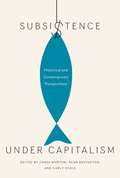- Table View
- List View
Subjects of Intergenerational Justice: Indigenous Philosophy, the Environment and Relationships (Routledge Environmental Humanities)
by Christine J. WinterThis book challenges mainstream Western IEJ (intergenerational environmental justice) in a manner that privileges indigenous philosophies and highlights the value these philosophies have for solving global environmental problems. Divided into three parts, the book begins by examining the framing of Western liberal environmental, intergenerational and indigenous justice theory and reviews decolonial theory. Using contemporary case studies drawn from the courts, film, biography and protests actions, the second part explores contemporary Māori and Aboriginal experiences of values-conflict in encounters with politics and law. It demonstrates the deep ontological rifts between the philosophies that inform Māori and Aboriginal intergenerational justice (IJ) and those of the West that underpin the politics and law of these two settler states. Existing Western IEJ theories, across distributional, communitarian, human rights based and the capabilities approach to IJ, are tested against obligations and duties of specific Māori and Aboriginal iwi and clans. Finally, in the third part, it explores the ways we relate to time and across generations to create regenerative IJ. Challenging the previous understanding of the conceptualization of time, it posits that it is in how we relate—human to human, human to nonhuman, nonhuman to human—that robust conceptualization of IEJ emerges. This volume presents an imagining of IEJ which accounts for indigenous norms on indigenous terms and explores how this might be applied in national and international responses to climate change and environmental degradation. Demonstrating how assumptions in mainstream justice theory continue to colonise indigenous people and render indigenous knowledge invisible, this book will be of great interest to students and scholars of environmental and intergenerational philosophy, political theory, indigenous studies and decolonial studies, and environmental humanities more broadly.
Subjektunabhängige, analytische Unternehmensethik: Begründung und Relevanz als praktisch-normative Betriebswirtschaftslehre
by Florian FuchsIn diesem Open-Access-Buch beleuchtet Florian Fuchs den historischen Diskurs um eine Integration ethischer Fragestellungen in die betriebswirtschaftliche Forschung. Vor dem Hintergrund einer bisher fehlenden originären Mesoethik entwickelt er mit einem Rekurs auf die Erkenntnisse der neueren Systemtheorie eine neue Unternehmensethikkonzeption. Diese ermöglicht erstmalig die Konzeption einer genuinen Unternehmensethik als strukturiertes Legitimitätsmanagement. Seit der Begründung der Betriebswirtschaftslehre Ende des 19. Jahrhunderts wird um die Sinnhaftigkeit und Möglichkeit einer fundierten Beschäftigung mit normativen Aussagen im Allgemeinen, sowie einer Forschungstätigkeit in der Domäne der Wirtschaftsethik im Speziellen, intensiv wie kontrovers gerungen. Dabei bleibt vor dem Hintergrund zahlreicher Unternehmensskandale und einer zunehmenden gesellschaftlichen Kritik an der Wirtschaftspraxis eine kritische Reflexion wirtschaftlichen Handelns hochrelevant – wobei allerdings die Frage zu stellen ist, wie eine wirtschaftsethische Beschäftigung für die BWL wissenschaftshistorisch informiert wie auch wissenschaftstheoretisch fundiert zu begründen wäre.
Sublime Economy: On the intersection of art and economics (Routledge Frontiers of Political Economy #Vol. 111)
by Jack Amariglio Joseph W. Childers Stephen E. CullenbergOver the last two centuries, artists, critics, philosophers and theorists have contributed significantly to such representations of "the economy" as sublime. It might even be said that much of the emergence of a distinctly "modern" art in the West is inextricably linked to the perception of art’s own autonomy and, therefore, its privileged, mostly critical, gaze at the terrible mixture of wonder and horror of capitalist economic practices and institutions. The premise of this collection is that despite this perceptual sharing, "sublime economy" has yet to be investigated in a purely cross-disciplinary way. Sublime Economy seeks to map this critical territory by exploring the ways diverse concepts of economy and economic value have been culturally constituted and disseminated through modern art and cultural practice. Comprising of 14 individual essays along with an editors’ introduction, Sublime Economy draws together work from some of the leading scholars in the several fields currently exploring the intersection of economic and aesthetic practices and discourses. A pressing issue of this cross-disciplinary conversation is to discern how artists’, writers’, and cultural scholars’ constructions of distinct conceptions of economic value, as pertains to aesthetic objects as well as to more "everyday" objects and relations of mass consumption, have contributed to the ways "value" functions in and across disparate discourses. Thus this book looks at how cultural critics and theorists have put forward working notions of economic value that have regularities and effects similar to those of the "expert" conceptions and discourses about value that have been the preserve of professional economists.
Subliminal Leadership: Why It Is as Important as Emotional Intelligence
by Thomas FranklUnderstanding the power of subliminal influence makes or breaks leaders. What is it that subliminally motivates people to give their best, not just what’s in their job description? How do you build an outstanding team? (Spoiler: it’s not just by putting the best people in a team.) The answer lies in the power of subliminal influence. This book explains in a clear and accessible way this important, yet little known and understood, area of psychology and leadership. As Emotional Intelligence helped managers and leaders to understand the importance of empathy in the workplace, Subliminal Leadership takes us to the next level by explaining how influence through non-verbal communication mostly happens below the threshold of our conscious awareness: subliminal forms of body language and communication which influence other people's attitudes, thinking and behavior – and which may boost, or undermine a leader's authority, the performance of teams or the quality of key customer relationships. Readers will learn how we unconsciously communicate and how we positively or negatively influence other people in the process. Understanding subliminal influence will help people in, or aspiring towards, leadership positions to build trust, understand others’ emotions, make better decisions, and strengthen professional relationships. Based on recent scientific research in disciplines as diverse as psychology, evolutionary biology, anthropology, medicine, neuroscience, and management studies, the book offers a breakthrough, multidisciplinary approach to influence and leadership. This book is for everyone interested in the psychological, biological, and medical dimensions of leadership.
Subliminal: How Your Unconscious Mind Rules Your Behavior
by Leonard MlodinowLeonard Mlodinow, the best-selling author of The Drunkard's Walk and coauthor of The Grand Design (with Stephen Hawking), gives us a startling and eye-opening examination of how the unconscious mind shapes our experience of the world and how, for instance, we often misperceive our relationships with family, friends, and business associates, misunderstand the reasons for our investment decisions, and misremember important events.Your preference in politicians, the amount you tip your waiter--all judgments and perceptions reflect the workings of our mind on two levels: the conscious, of which we are aware, and the unconscious, which is hidden from us. The latter has long been the subject of speculation, but over the past two decades researchers have developed remarkable new tools for probing the hidden, or subliminal, workings of the mind. The result of this explosion of research is a new science of the unconscious and a sea change in our understanding of how the subliminal mind affects the way we live.Employing his trademark wit and lucid, accessible explanations of the most obscure scientific subjects, Leonard Mlodinow takes us on a tour of this research, unraveling the complexities of the subliminal self and increasing our understanding of how the human mind works and how we interact with friends, strangers, spouses, and coworkers. In the process he changes our view of ourselves and the world around us.
Submarine Pipeline Integrity: Assessment of Failure Modes and Advanced Evaluation Techniques (Ocean Engineering & Oceanography #28)
by Jie Zhang Han Zhang Ruinan Lin Yifei WangThis book provides readers with recent insights and practical tools for the design, maintenance and repair of submarine pipeline. Based on research and field experience of the authors, it offers a comprehensive text on both the foundational aspects of pipeline integrity and the latest advancements in inspection and repair technologies. It covers visual, non-destructive testing, and intelligent technologies for inspection, and simulations and reliability analysis for assessing corroded pipelines. In turn, it examines impact damage mechanisms, and thermal buckling behavior. Further, it covers composite pipelines, including their mechanical properties and failure mechanisms under complex loads. It addresses dent behaviors in steel pipelines, highlighting innovative repair techniques and emerging trends. Written for professionals, such as engineers, project managers, and researchers, this book offers advanced insights and practical tools for assessing submarine pipelines operating under complex conditions in the context of increasingly challenging marine environments.
Submerging Markets
by Rich MarinoSubmerging Markets examines the analytical history of capital flows among the developed nations and the emerging markets from the 1990s to the current day. In terms of emerging markets, the arguments focus primarily on the BRICs: Brazil, Russia, India, China and now South Africa. Within that spectrum, it uses any number of analytical tools to measure capital flows, and capital formation within the context of globalized markets. An analysis of capital flows relative to the emerging markets' GDP growth rates over time determines the expectation of future growth rates. Included in the research design is specific data accumulated from the OECD's new global macroeconomic model. The results found in the analytical history provide the basic framework for a thesis that answers the following questions: will the new increase in financial regulations restrict capital flows to the emerging markets? If so, will this result in lower future growth rates for the BRICs?
Subnational Health Spending and Soft Budget Constraints in OECD Countries
by Adam Leive Thomas Stratmann Ernesto CrivelliA report from the International Monetary Fund.
Subprime Attention Crisis: Advertising and the Time Bomb at the Heart of the Internet (FSG Originals x Logic)
by Tim HwangFrom FSGO x Logic: a revealing examination of digital advertising and the internet's precarious foundationIn Subprime Attention Crisis, Tim Hwang investigates the way big tech financializes attention. In the process, he shows us how digital advertising—the beating heart of the internet—is at risk of collapsing, and that its potential demise bears an uncanny resemblance to the housing crisis of 2008. From the unreliability of advertising numbers and the unregulated automation of advertising bidding wars, to the simple fact that online ads mostly fail to work, Hwang demonstrates that while consumers’ attention has never been more prized, the true value of that attention itself—much like subprime mortgages—is wildly misrepresented. And if online advertising goes belly-up, the internet—and its free services—will suddenly be accessible only to those who can afford it. Deeply researched, convincing, and alarming, Subprime Attention Crisis will change the way you look at the internet, and its precarious future.FSG Originals × Logic dissects the way technology functions in everyday lives. The titans of Silicon Valley, for all their utopian imaginings, never really had our best interests at heart: recent threats to democracy, truth, privacy, and safety, as a result of tech’s reckless pursuit of progress, have shown as much. We present an alternate story, one that delights in capturing technology in all its contradictions and innovation, across borders and socioeconomic divisions, from history through the future, beyond platitudes and PR hype, and past doom and gloom. Our collaboration features four brief but provocative forays into the tech industry’s many worlds, and aspires to incite fresh conversations about technology focused on nuanced and accessible explorations of the emerging tools that reorganize and redefine life today.
Subprime Crisis and Fair-Value Accounting
by Paul M. Healy Krishna G. Palepu George SerafeimThis case examines the challenges in implementing fair value accounting for mortgage instruments, the role of accounting in the sub-prime crisis, and proposals for revising accounting standards given the crisis.
Subprime Meltdown: American Housing and Global Financial Turmoil
by Julio J. RotembergThis case focuses on the financial difficulties faced in the US from August to December 2006 as well as their roots in subprime lending. After briefly discussing how mortgages were structured and traded in the pre-1990 period, it describes subprime mortgage lending, as well as other innovative mortgages issued in the 1990s. It also discusses how these mortgages were packaged into securities, and who ultimately came to own these claims and their attendant risk. The case then describes the pain inflicted by raising foreclosures, as well as the financial market ramifications of the rise in mortgage delinquencies. It also chronicles the response of the US and European central banks to the unfolding financial difficulties. Lastly, the case lays policies that have been proposed to deal with either the consequences or the causes of the crisis. These include policies for reforming the supervision of the financial system, changing bankruptcy rules and regulating mortgage finance. Some attention is paid to the role of credit rating agencies in the crisis, and in the financial system as a whole.
Subregional International Economic Integration: Theory and Practice
by Shuanglu LiangThis work uses international economics and space economics theory to study the regional economic integration of China's border areas with the increasing integration of China's border areas, and to realize the theory and countermeasures of economic development across border areas. As China's economy pivots towards neighboring developing countries in Southeast Asia, new economic rhythms come into being; this book seeks to explore the practicalities thereof, in a text that will interest economic researchers, researchers of China's economy, and scholars of international relations.
Subroto Bagchi: On Leadership & Innovation
by Subroto BagchiIndia's bestselling business books author, Subroto Bagchi, writes on two topics of utmost importance in our rapidly changing and increasingly uncertain world. Drawing on stories and experiences of leaders and innovators, both famous and not so well-known, in history and in the corporate world, he writes with characteristic eloquence and wisdom on these topics. This exclusive ebook also features an extract from Bagchi's latest offering, The Elephant Catchers: Key Lessons for Breakthrough Growth.
Subscribe Now!
by Danny Newman"Buy it, borrow it, steal it, but get your hands on it! If you follow Danny's advice on how to sell tickets, you won't have an unsold seat in the house all season long!"--Ralph Black, American Symphony League
Subscribed: Why the Subscription Model Will Be Your Company's Future - and What to Do About It
by Tien Tzuo Gabe WeisertCompanies like Netflix, Spotify, and Salesforce are just the tip of the iceberg for the subscription model. The real transformation--and the real opportunity--is just beginning.Subscription companies are growing nine times faster than the S&P 500. Why? Because unlike product companies, subscription companies know their customers. A happy subscriber base is the ultimate economic moat. Today's consumers prefer the advantages of access over the hassles of maintenance, from transportation (Uber, Surf Air), to clothing (Stitch Fix, Eleven James), to razor blades and makeup (Dollar Shave Club, Birchbox). Companies are similarly demanding easier, long-term solutions, trading their server rooms for cloud storage solutions like Box. Simply put, the world is shifting from products to services.But how do you turn customers into subscribers? As the CEO of the world's largest subscription management platform, Tien Tzuo has helped hundreds of companies transition from relying on individual sales to building customer-centric, recurring-revenue businesses. His core message in Subscribed is simple: Ready or not, excited or terrified, you need to adapt to the Subscription Economy -- or risk being left behind.Tzuo shows how to use subscriptions to build lucrative, ongoing one-on-one relationships with your customers. This may require reinventing substantial parts of your company, from your accounting practices to your entire IT architecture, but the payoff can be enormous. Just look at the case studies: * Adobe transitions from selling enterprise software licenses to offering cloud-based solutions for a flat monthly fee, and quadruples its valuation. * Fender evolves from selling guitars one at a time to creating lifelong musicians by teaching beginners to play, and keeping them inspired for life. * Caterpillar uses subscriptions to help solve problems -- it's not about how many tractors you can rent, but how much dirt you need to move. In Subscribed, you'll learn how these companies made the shift, and how you can transform your own product into a valuable service with a practical, step-by-step framework. Find out how how you can prepare and prosper now, rather than trying to catch up later.
Subscriber Models
by Robin Greenwood Mihir A. Desai Lucy White"Most investment projects are valued by first computing the free cash flows generated in each period, then discounting these cash flows back to the present, and finally summing these to give the net present value of the project. Typically, the cash flows used in the valuation come from forecasts of future revenues, combined with forecasts of future costs, by assuming historic margins as a percent of sales. Because forecasted cash flows rely heavily on aggregate sales and ratios relative to sales, this technique is often called the “percent-of-sales” approach to calculating cash flows. <P> The percent-of-sales approach can be useful in a number of settings. In particular, it may apply when unit volume growth is predictable and when the business is characterized by regular but randomly timed sales of manufactured goods. But fewer and fewer businesses can be described this way today. Service businesses, for example, are not always well suited to the percent-of-sales approach because sales are not simply the revenues from randomly timed transactions, but rather repeated interactions with known customers. Common examples in recent years include “Software as a Service”, magazine publishing, and cellular phone service. For these businesses, computing the free cash flows in each period can be difficult, complicated by the fact that customers are coming and going at all times."
Subservience to Purpose: Affect Tolerance--How Great Leaders Channel Intense Emotions into Actions That Ensure Progress
by Justin MenkesGreat leaders, like all human beings, experience a full range of emotional reactions every day. They are not immune to anger, frustration, anxiety, or fear, and this fact is intensified by today's fast-paced environment. But leaders who are subservient to a purpose channel their emotions; they see challenges as stimulating and are able to react to setbacks and unforeseen events in ways that ensure rather than stifle progress. In this chapter, executive assessment expert Justin Menkes shows how you can use this skill--called "affect tolerance"--to help you manage your own emotions in stressful situations. One particular trap some leaders fall into is a sense of their own self-importance when they are challenged: Menkes shows why this is a grave error and how you can learn to manage this reflex. Case study illustrations of prominent leaders--including Jim McNulty (Parsons Corporation), Raymond Milchovich (Foster Wheeler), Chris Van Gorder (Scripps Health System), Fred Smith (FedEx), and Barack Obama--bring these ideas vividly to life. The chapter ends with practical suggestions and an exercise for improving your ability to reframe your strong emotions in a broader, more meaningful context and, in doing so, remain subservient to a higher purpose. This chapter was originally published as Chapter 5 of "Better Under Pressure: How Great Leaders Bring Out the Best in Themselves and Others."
Subservience to Purpose: Affiliations Based on Shared Dedication--How Great Leaders Form Work Relationships That Generate Peak Performance
by Justin MenkesAlthough realistic optimism is the catalyst that allows great leaders to see and address deficiencies in themselves and the world around them--and thus grow and realize their potential and the potential of others--subservience to purpose gives them the drive to do so. Leaders who demonstrate subservience to purpose put a particular pursuit--such as their company's mission--ahead of their own comfort. But great leaders aren't slavishly devoted to their work at the expense of all else; they have simply made a deliberate choice about the degree of importance they assign to their chosen goal. Psychologist and executive assessment expert Justin Menkes deftly draws you into this chapter with a self-test that lets you quickly evaluate your own level of subservience to purpose. It's a potent introduction to the concept of "affiliations based on shared dedication"--in other words, the importance great leaders place on gathering a team that collectively values the mission of the company as the most important driver of their connection to one another. In short, if you as a leader do not form work relationships characterized by a shared dedication to purpose, you will be unable to realize your own potential, and your people will ultimately fail as well. The chapter illustrates what these relationships look like in practice--and what they don't--through the real-life examples of Miles White, chairman and CEO of Abbott Laboratories, and Ralph Larsen, former chairman and CEO of Johnson & Johnson, among others. The chapter concludes with a section entitled "Traps to Avoid in Work Affiliations," a cautionary tale for anyone who struggles to keep their need to be liked subordinate to their goals as a leader. This chapter was originally published as Chapter 4 of "Better Under Pressure: How Great Leaders Bring Out the Best in Themselves and Others."
Subsidizing Culture: Taxpayer Enrichment of the Creative Class
by James T. BennettIn the American mind, state subsidization of writers and artists was long associated with monarchies and, in later years, socialist states. The support these regimes gave to intellectuals was understood to come with a cost, yet, beginning with the New Deal's Federal Writers', Art, and Theater Projects, a new policy consensus asserted that by offering financial support to the arts, the federal government was affirming their importance to the nation.Subsidizing Culture examines the development of and controversies surrounding federal programs that directly benefit writers, artists, and intellectuals. James T. Bennett examines four cases of such support: the New Deal's Federal Writers', Art, and Theater Projects; the vigorous promotion, in the post-World War II and early Cold War eras, of abstract expressionism and other forms of modern art by the US government; the National Endowment for the Arts (NEA), which has fortified its position as the preeminent arts bureaucracy; and the National Endowment for the Humanities, the NEA's less embattled twin, which funnels monies to scholars.Bennett concentrates on the creation of and the debate over these government programs, and he gives special attention to the critics, who are usually ignored. He reminds us that the chorus of anti-subsidy voices over the years has included such disparate figures as writers William Faulkner and John Updike; artists John Sloan and Wheeler Williams; and social critics Jacques Barzun and H.L. Mencken.
Subsistence Agriculture and Economic Development
by Jr. Clifton R. WhartonOne of the more perplexing problems of economic development is helping subsistence farmers break away from production simply for home consumption to become commercial farmers, producing more and more for sale in the marketplace. Although subsistence farms occupy 40 percent of the worlds cultivated land and support half of mankind, facts about them and programs to increase their output are scattered. Subsistence Agriculture and Economic Development provides a unique overview of these difficulties and their significance to economic development. It is the first book to subject subsistence agriculture to rigorous multi-disciplinary examination and to bring to light new theory and empirical evidence directed toward solving the problem.This volume contains original chapters by forty leading social scientists and agricultural specialists who summarize contemporary theory, fact, and policy on the problems of developing agriculture from subsistence to a commercial basis. Each contributor speaks from one or more of the relevant standpoints of economics, sociology, agronomy, political science, anthropology, and social psychology. There emerges a clear, meaningful picture of the subsistence farmer and the problems involved in changing his attitudes, methods of production, and economic and social environment.Broad in scope, documented with pertinent case studies, and far-reaching in its guidelines for future research and policy, this work should be read by all concerned with increasing food production and with economic development. This is an area of special concern in the uses of food products as the basis for new energy resources - an issue of increasing importance in the advancing use of ethanol as a fuel drawn from corn products.
Subsistence Agriculture in the US: Reconnecting to Work, Nature and Community (Routledge-SCORAI Studies in Sustainable Consumption)
by Ashley ColbyFocusing on ethnography and interviews with subsistence food producers, this book explores the resilience, innovation and creativity taking place in subsistence agriculture in America. To date, researchers interested in alternative food networks have often overlooked the somewhat hidden, unorganized population of household food producers. Subsistence Agriculture in the US fills this gap in the existing literature by examining the lived experiences of people taking part in subsistence food production. Over the course of the book, Colby draws on accounts from a broad and diverse network of people who are hunting, fishing, gardening, keeping livestock and gathering and looks in depth at the way in which these practical actions have transformed their relationship to labor and land. She also explores the broader implications of this pro-environmental activity for social change and sustainable futures. With a combination of rigorous academic investigation and engagement with pressing social issues, this book will be of great interest to scholars of sustainable consumption, environmental sociology and social movements.
Subsistence Entrepreneurship: The Interplay of Collaborative Innovation, Sustainability and Social Goals (Contributions to Management Science)
by Paul Jones Vanessa Ratten Vitor Braga Carla Susana MarquesThis book focuses on the role of subsistence entrepreneurs in creating social and sustainable business opportunities on the global marketplace. Subsistence entrepreneurs use scarce resources to create new business opportunities, often in developing or emerging economies. In addition, subsistence entrepreneurship is increasingly being used as a way to facilitate market entry for small and medium-sized business enterprises that focus on collaborative innovation. The interdisciplinary contributions gathered here will expand readers’ understanding of the nature and characteristics of subsistence entrepreneurs, as well as the challenges they face. The central connection between subsistence, sustainability and social entrepreneurship is also explored.
Subsistence Whaling: Past History and Contemporary Issues
by Gregory G. Monks Nobuhiro Kishigami James M. SavelleThis book examines the past history, and contemporary status of subsistence whaling. The papers derive from a symposium ‘Aboriginal Whaling and Identity in the 21st Century’ held at the Eleventh Conference on Hunting and Gathering Societies in Vienna, Austria in September 2015. Whales, especially large baleen whales, are the largest animals targeted by many societies, prehistoric or modern, and major facets of subsistence, social structure and ideology are still deeply embedded in past and current whaling lifeways. Yet there is probably no other environmental/political issue that has attracted as much attention in the late 20th and early 21st century as whaling practices and policies. Accordingly, the papers address two major themes: 1) the extent and characteristics of major prehistoric and early historic whaling activities, and 2) case studies amongst modern whaling societies, and how these societies are impacted by current political and economic realities and by the anti-whaling movement.
Subsistence under Capitalism: Historical and Contemporary Perspectives
by James Murton Dean Bavington Carly DokisThe complex relationship between subsistence practices and formal markets should be a growing matter of concern for those uneasy with the stark contrast between commercial and local food systems, especially since self-provisioning has never been limited to the margins. In fact, subsistence occupies a central space in local and global economies and networks. Bringing together essays from diverse disciplines to reflect on the meaning of subsistence in theory and in practice, in historical and contemporary contexts, in Canada and beyond, Subsistence under Capitalism is a collective study of the ways in which local food systems have been relegated to the shadows by the drive to establish and expand capitalist markets. Considering fishing, farming, and other forms of subsistence provisioning, the essays in this volume document the persistence of these practices despite capitalist government policies that actively seek to subsume them. Presenting viable alternatives to capitalist production and exchange, the contributors explain the critical interplay between politics, local provisioning, and the ultimate survival of society. Illuminating new kinds of engagements with nature and community, Subsistence under Capitalism looks behind the scenes of subsistence food provisioning to challenge the dominant economic paradigm of the modern world.
Subsistence under Capitalism: Historical and Contemporary Perspectives
by James Murton Dean Bavington Carly DokisAn understanding of subsistence is crucial to comprehending and challenging the human relationship to nature under capitalism.
